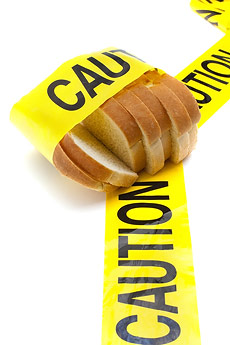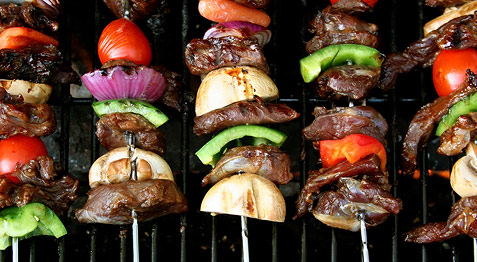
04/11/2012
Furci Home / Fitness Channel / Bullz-Eye Home
Every January, like clockwork, gyms across the country sell an incredible number of memberships; home fitness equipment flies out of stores; people become more food conscience. One would think that every year a great number of people would be getting into shape, starting with the New Year. Unfortunately, every year people start their resolutions, and every year the vast majority give up within the first several weeks.
To help combat the resolution failure rate, I wrote an article earlier this year, Keeping Your New Year's Resolution, which concentrated on the steps used in setting proper goals, and included invaluable tools in helping you achieve those goals. In this article I'm going to focus on principles you can use to help attain fitness goals. Specifically, losing body fat, which is one of the most common resolutions made.
IT'S WHAT YOU'RE EATING
 The enemy to weight loss and health is not fat, protein or carbohydrates. It's fat, protein, carbohydrates (and other manmade substances) consumed with the low-fat/high-carbohydrate diet that has been forced upon us by the medical, food and edible oil industries. Started in the mid-1950s as the Lipid Hypothesis , this politically correct diet has been a dismal failure. We are getting fatter and unhealthier because we are eating anything other than what our bodies are designed to process. Add to this the fact that most Americans get the vast majority of their physical activity walking to and from their cars, and you have a recipe for disaster.
The enemy to weight loss and health is not fat, protein or carbohydrates. It's fat, protein, carbohydrates (and other manmade substances) consumed with the low-fat/high-carbohydrate diet that has been forced upon us by the medical, food and edible oil industries. Started in the mid-1950s as the Lipid Hypothesis , this politically correct diet has been a dismal failure. We are getting fatter and unhealthier because we are eating anything other than what our bodies are designed to process. Add to this the fact that most Americans get the vast majority of their physical activity walking to and from their cars, and you have a recipe for disaster.
Although a lack of physical activity plays a role in our being fat, carbohydrates -- especially simple carbs or sugar -- shoulder most of the blame. There are many people who exercise regularly, and yet cannot seem to lose the excess fat. They are not giving their bodies a reason to use fat as fuel. If you're not losing fat, you're eating the wrong foods. It's astonishing how many people will say, "I'm eating right, I just can't lose the weight."
The sole purpose of carbohydrates is to provide energy. Whatever your body doesn't use as fuel is stored as fat. It's important to understand carbohydrates are a non-essential nutrient, meaning humans do not need to consume them for survival, or even health. Our bodies function perfectly -- and are much healthier -- without carbohydrates, especially sugars and starches.
In order to understand why carbohydrates are your worst enemy when trying to get lean, you have to understand insulin. Insulin is the fat storage hormone. Quite simply, the higher your insulin level is, the more you store food as fat.
As you eat carbs, the body breaks them down into a simple, more absorbable sugar called glucose. The glucose is absorbed by the small intestine and is then transported to the blood stream. As your blood glucose levels rise, this sends a signal to the pancreas to release insulin. Insulin governs the processing of glucose, and is necessary for glucose to pass through cell walls. Without insulin, as with Type I diabetics, glucose levels will rise to toxic levels in the bloodstream. Eventually, you will develop ketoacidosis. If not treated, this will cause death.
As important a role as insulin has, it's imperative to keep levels low for optimum health. Higher insulin levels are related to obesity, high blood pressure, Type II diabetes, elevated cholesterol and heart disease. Insulin is a facilitator of lipogenesis, or fat storage, and a deterrent to lipolysis, or the breaking down of fat for energy. Even low levels of circulating insulin have been shown to prevent the breakdown of fat to be used as energy. As stated above, insulin is the fat storage hormone.
IT'S NOT HOW MUCH YOU EAT
Let's get down to basic facts. All macronutrients, including fats, carbohydrates and protein, contain energy. The energy contained in food is expressed as calories. We tend to associate calories with food, but in reality calories apply to anything. For example, a gallon of gasoline contains approximately 31 million calories.
Because of the bombardment of misinformation over several decades, many people who want to lose body fat think there is only one thing that matters when trying to lose weight: calories consumed versus calories used. Many self-proclaimed experts perpetuating the calorie theory, including doctors, nurses, dieticians, nutritionists, trainers, coaches and most of all the media, all prosthelytize that a calorie of protein is equal to a calorie of fat is equal to a calorie of carbs, and that all you have to do is cut down the amount consumed to lose body fat. However, in order for this to be true, the physiological process by which the body transforms food into energy – metabolism – is the same for every type of food. This is a simplistic, unscientific and untenable view.

Calories are measured in a sealed device called a "calorimeter." A calorimeter is simply an instrument used to measure the heat of something. There are many different types of calorimeters, and with the help of a bomb calorimeter an accurate measurement of the amount of energy produced by food can be obtained. A small volume of water is positioned above the food to be tested, which is then burned. Once the food is completely burned, the temperature of the water is measured. The rise in temperature will determine the amount of calories. A calorie is the amount of heat needed to raise 1 kilogram of water 1 degree Celsius at sea level.
A machine cannot be used to conclude what happens inside the human body. The calorimeter can show the total amount of energy in a serving of Fruit Loops, but it cannot account for what the human body doesn't absorb (eliminates), or the energy used in the digestion and assimilation of it. Moreover, it cannot show your efficiency at using food as energy, as opposed to storing it as fat.
The efficiency at which a person burns food as fuel decreases as you get fatter; therefore, the higher a person's body fat percentage, the more apt they are at storing food as body fat. This is because a higher body fat percentage and insulin insensitivity have a linear relationship. This causes an extraordinary release of insulin when food is consumed. The macronutrient that is responsible for these large surges of insulin is carbohydrates; they can be a nightmare for any person, especially somebody who is overweight, trying to lose body fat.
NUTRITION PRINCIPLES
 If you're hungry, eat. If you're not, don't.
If you're hungry, eat. If you're not, don't.
Under no circumstances should you count calories, ever.
Avoid calorie-dense fast foods. (Mainly processed, fast foods, fruit juice, soda pop and other high-carb foods.)
Plan your meals, and prepare your food in advance. This is perhaps the single biggest contributor to consistent healthy eating. You're less likely to fall off the wagon if there is quality food already made.
Eat at least four meals per day. Your goal should be to eat six times per day, once every two to three hours. A healthy snack, e.g., vegetables, cottage cheese, sugar-free yogurt, etc., is considered a meal.
Make sure to eat a portion of protein with every meal. If your meal consists of a starchy carb, always consume a bit of your protein first. This ensures a lower glycemic index for the meal and will curb eating too many carbs.
A portion of protein is four to eight ounces, or a portion is about the size of the palm of your hand or a clenched fist.
Choose carbohydrates that are on the lower end of the glycemic index. Refer to the Approved Foods chart.
Whenever time is of the essence, use meal replacement packs, protein powders and drinks, cottage cheese, yogurt, etc. This takes the guesswork out of meal planning during a busy day.
Use natural unprocessed fats and oils for cooking and salad dressings. Avoid using, or strictly limit, your consumption of polyunsaturated fats (vegetable oils) and never cook with them.
You can follow us on Twitter and Facebook for content updates. Also, sign up for our email list for weekly updates and check us out on Google+ as well.













